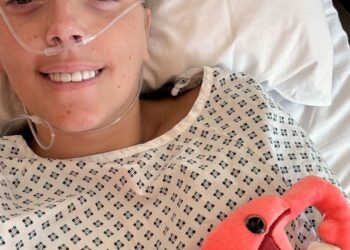Aphasia is an invisible disability – a neurogenic language disorder that can significantly impact a person’s communication abilities
It’s a condition that can have a massive impact on the quality of life of the person living with it and their family and friends yet very little is truly known about aphasia.
In recognition of Aphasia Awareness Month this June, Dr Shane Cassidy and his team at Neurolinks are proud to spotlight the transformative role of Neurologic Music Therapy (NMT) in enhancing communication for individuals living with aphasia. Despite an estimated 250,000 people in Ireland living with aphasia, awareness and understanding of this condition remains low.
Understanding aphasia
Each person with aphasia has a unique set of strengths and challenges in their communication. Some experience word-finding difficulties, while others struggle to understand or use spoken or written language. It is important to note that aphasia doesn’t impact a person’s intelligence. While people living with aphasia may have difficulty communicating their thoughts, they still think in the same way. The most common cause of aphasia is stroke. Other causes include acquired brain injury, brain infections or tumours. Primary progressive aphasia is a form of aphasia that is a subtype of frontotemporal dementia.
Dr. Cassidy says: “Language is crucial for connecting with others and completing daily tasks, so aphasia can significantly affect relationships, social inclusion, access to information and services, life roles, occupations, and overall well-being. Consequently, aphasia can impact the quality of life for both the person living with the condition and their family and friends.”
Science-led treatment
Neurolinks provides professional music services for people who are living with any neurological condition as well as their family and caregivers. It is dedicated to supporting people with aphasia through innovative and evidence-based music therapy techniques. One particularly effective NMT technique for individuals with aphasia is Melodic Intonation Therapy (MIT). Backed by a substantial evidence-base outlining its efficacy, MIT uses the musical elements of speech to improve an individual’s fluency in speaking functional words and phrases. Using normal speech inflection patterns as a guide, MIT incorporates rhythm and music to support speech recovery. The musical elements engage the language-capable regions of the undamaged right hemisphere to support speech and language recovery.
“Often our clients experience other communication difficulties alongside aphasia, such as dysarthria or apraxia of speech. Music therapy programs are customised to target each of our client’s unique goals and may incorporate one of several evidence-based techniques,” explains Dr Shane Cassidy, founder of Neurolinks.
“Our work at Neurolinks often involves collaborating and working closely with other members of interdisciplinary teams, including speech and language therapists. In this way, we can work together to ensure that our goals for music therapy are person-centred and support our clients in the most meaningful and impactful way.”
Family members and carers of individuals living with aphasia are frequently invited to sessions so neuroscience-based music therapy tools and techniques can be shared that can facilitate and support their communication and interaction in a meaningful way.
Real life case studies
Ellie
“After her stroke, Ellie’s speech would frequently ‘get stuck.’ With music therapy at Neurolinks, Ellie learned to say her name, address and phone number without getting stuck. Being able to produce this information accurately was very important to her sense of independence when talking with strangers” – Speech and Language therapist at the Royal Hospital Donnybrook.
Mary
“After her stroke, Mary had almost no verbal output. At first, her Music Therapy sessions with Neurolinks helped her to produce “Yes” and “No” which was a great starting point. It made a huge difference to her and to her family. Over 6-8 sessions, her face would light up as she learned to produce more words using music therapy techniques. Those learned words helped reduce her frustration and enabled her to participate more in conversations.“ – Speech and Language therapist at the Royal Hospital Donnybrook
Jack
Jack attended six music therapy sessions at Neurolinks with the goals of supporting his emotional expression, emotional regulation and lifting his mood through music therapy. During his sessions, Jack shared that since his stroke, he’s been unable to verbalise or communicate the love he feels for his family. Through song-writing and verbal processing, music therapy supports Jack’s goals of expressing his emotions through music. Jack recorded a song for his granddaughter with lyrics by Jack himself and a verse written by his wife.
*Pseudonyms have been used in case studies to protect the anonymity of clients.
Free Event
To raise awareness and understanding of the benefits of music therapy, Neurolinks is hosting a free event on 28 June at 11am. Attendees will have the opportunity to learn more about music therapy and experience some of the techniques first-hand. The event will take place in the Talbot Hotel Stillorgan and booking is essential as places are limited. Email hello@neurolinks.ie or phone/text 087-2839279 to reserve your place.








